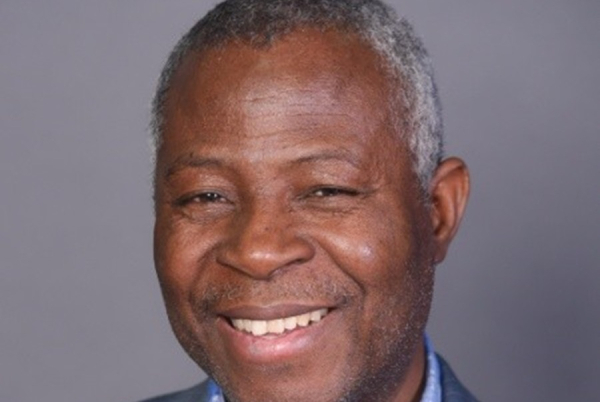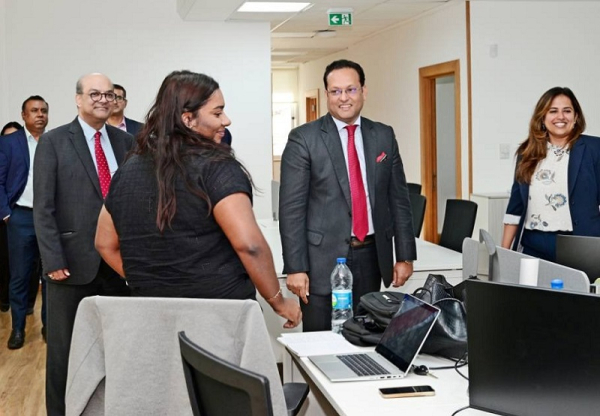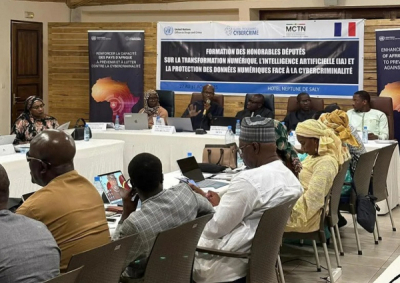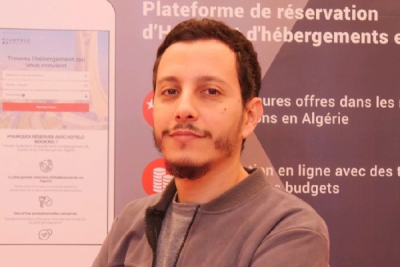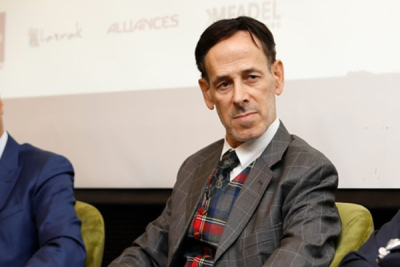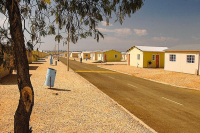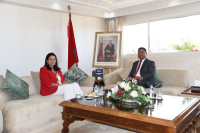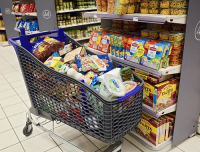-
Sény Ganemtore's Mtopo Payment Solutions simplifies West African SME transactions.
-
The fintech startup offers mobile money processing and digital management tools.
-
Conekto app provides real-time transaction tracking, enhancing productivity for businesses.
Sény Ganemtore, a Burkinabe electronics engineer with extensive experience in telecommunications and mobile payments, is the founder and CEO of Mtopo Payment Solutions, a financial technology startup. Established in 2016, Mtopo Payment Solutions focuses on mobile money payment processing and developing management tools to support the digitalization of small and medium-sized enterprises (SMEs) across West Africa.
The company offers several digital solutions designed to enhance productivity and optimize internal management for businesses. Among these, Conekto is an application that simplifies daily life for its users by streamlining purchases, mobile wallet management, and centralizing digital operations. The platform provides real-time transaction tracking through SMS and email notifications.
Ganemtore is an alumnus of the Institut National Supérieur de l’Enseignement Technique (INSET) in Yamoussoukro, Côte d’Ivoire, where he earned a master’s degree in electrical, electronic, and communications engineering in 1994.
His career began in 1997 at Loteny Telecom as a regional maintenance manager in Yamoussoukro. He later became head of operations and maintenance in Abidjan in 1998, and then head of the radio and optimization division between 2001 and 2005. Prior to founding Mtopo Payment Solutions, he held several positions in various telecommunications companies.
This article was initially published in French by Melchior Koba
Adapted in English by Ange Jason Quenum
- Mauritius launches inter-ministerial committee to coordinate national digital transformation strategy.
- Committee focuses on digitizing schools, public alerts, social benefits, and protecting vulnerable users.
- Island nation ranks highly in e-governance, AI readiness, and digital infrastructure in Africa.
The Mauritian government has established an inter-ministerial committee to coordinate the implementation of its national digital strategy, unveiled in May 2025. The inaugural meeting of this new body took place on August 26 in Ébène, chaired by the Ministry of Information Technology, Communication and Innovation (MITCI).
The committee will serve as a single point of contact to ensure coherence across various ministries involved in the digital transformation. Discussions at the meeting focused on several priority areas, including the digitization of schools, the establishment of a national public alert system, the development of a platform for managing social benefits, and reducing delays in public service delivery. Authorities also emphasized the critical need to protect vulnerable populations from online abuses.
This initiative aims to accelerate the modernization of Mauritian administration and strengthen the state's capacity to offer more efficient and inclusive services. It comes as African nations increasingly adopt e-governance programs to enhance public service quality and support their broader digital transformation efforts.
Mauritius has consistently demonstrated strong performance in digital development. In 2024, the Republic of Mauritius ranked 76th globally for its online administration development, placing it at the forefront in East Africa, according to the United Nations Department of Social Affairs. The island nation also secured the 69th position globally and 2nd in Africa for its AI readiness, surpassing South Africa and Morocco, as reported by UK-based consultancy Oxford Insights. Furthermore, the International Telecommunication Union (ITU) positions Mauritius as the 3rd in Africa for its digital infrastructure development.
Should these projects progress as planned, the island nation is poised to further solidify its position in digital governance. This momentum is also expected to bolster citizen confidence in digital administration.
This article was initially published in French by Adoni Conrad Quenum
Adapted in English by Ange Jason Quenum
- Senegal launches 'New Deal Technologique' to digitize public services, including parliamentary operations.
- Lawmakers receive training in AI, cybersecurity; electronic voting system adopted for real-time suffrage.
- Despite progress, African parliaments lag in digital maturity, highlighting need for continued investment.
Senegal is accelerating its national digital transformation strategy, dubbed the "New Deal Technologique," launched in February. This initiative aims to enhance the efficiency of public services through widespread digitization, with a particular focus on the legislative branch.
In a collaborative effort, the Senegalese government, the National Assembly, and the United Nations Office on Drugs and Crime (UNODC) recently concluded a five-day digital training workshop for members of parliament. This program is part of broader actions designed to fast-track the digital evolution of the parliamentary institution.
The strategic workshop focused on equipping lawmakers with essential skills in digital transformation, artificial intelligence (AI), personal data protection, and cybersecurity. The objective is to empower them to guide the nation towards digital sovereignty by crafting public policies and legislation that address contemporary challenges, aligning with the "New Deal Technologique" framework.
Significant strides have already been made. In December 2024, the National Assembly implemented an electronic voting system, featuring a platform capable of recording votes in real-time. El Malick Ndiaye, President of the National Assembly, has prioritized the digitization of parliamentary services. The modernization plan also includes the development of an interactive institutional website for b
oth deputies and citizens, alongside the launch of a parliamentary television channel. A dedicated project team has been established to oversee this transformation.
Further demonstrating this commitment, President Ndiaye met with a delegation including executives from the technology company Airudi in May to explore potential collaborations in AI, digital transformation, and professional training. These efforts unfold within a context of profound technological shifts in parliaments globally, driven by demands for greater efficiency, transparency, and citizen participation, as highlighted by the Inter-Parliamentary Union (IPU) in its 2024 World e-Parliament Report.
"Traditional siloed systems are giving way to more integrated and intelligent cloud-based solutions. AI, machine learning, and natural language processing are revolutionizing everything from document management to cybersecurity. These technologies enable parliaments to automate routine tasks, better analyze data, and offer more responsive services to parliamentarians, staff, and citizens," the IPU report, published in October 2024, states.
However, the digital transformation process within the Senegalese Parliament remains in its nascent stages. According to the IPU, the most digitally advanced African parliaments include South Africa, Zimbabwe, Burundi, Morocco, and Mauritius, followed by Tunisia and Malawi. The report indicates that Sub-Saharan Africa remains largely underrepresented among top-performing parliaments, with 50% of its institutions ranked among the 30 least advanced in terms of digital maturity.
This disparity is primarily attributed to a lack of modernization initiatives, insufficient investment in digital systems, and the absence of ambitious digital transformation programs.
This article was initially published in French by Isaac K. Kassouwi
Adapted in English by Ange Jason Quenum
He develops digital businesses, with operations ranging from online health and hospitality management to IT services.
Rachid Maou, an Algerian entrepreneur who earned a master's degree in computer science from Badji Mokhtar Annaba University in 2011, is the co-founder and general manager of DZDOC, a health tech startup.
Founded in 2015, DZDOC developed a multi-service online medical platform. For patients, the platform simplifies access to care by allowing them to search for and book appointments with doctors. The service is free and includes appointment reminders via text message or email.
The platform provides healthcare professionals with management tools for scheduling, video consultations, patient monitoring, and interpreting results. Its stated goal is to improve healthcare accessibility in Algeria through digital tools.
DZDOC also provides medical information content and allows users to save their favorite practitioners for easy access. The company was named Algeria's best health website at the 2016 Algeria Web Awards. It now has more than 21,300 registered practitioners and thousands of daily users.
Maou's first venture was Khidma Tech, an IT company he founded in 2013, and where he serves as director. The company designs, publishes, and develops software, websites, and online platforms. He is also the co-founder and director of Hotelo, a solution for hoteliers to manage their daily operations.
Melchior Koba
-
Mauritius ranks top in Africa for AI readiness and ICT infrastructure.
-
National Digital Mauritius 2030 plan drives inclusive, next-gen digital economy.
-
Strategic international partnerships boost innovation, start-ups, and tech adoption.
Mauritius is positioning itself as a digital hub at the crossroads of Africa and the Indian Ocean, leveraging strategic vision, innovation, and international collaboration to become a model of digital transformation.
The island nation has advanced rapidly in recent years through coherent strategies, heavy infrastructure investments, and continuous support for innovation. These efforts place Mauritius among Africa’s best-prepared countries for a digital economy transition.
International Rankings Highlight Progress
The United Nations’ 2024 E-Government Development Index ranks Mauritius 76th globally, underlining its leadership in East Africa with a score of 0.7506. Meanwhile, the AI Readiness Index 2024, which assesses governance, technological capabilities, and data availability, ranks Mauritius 69th worldwide—second in Africa and first in Sub-Saharan Africa—outperforming South Africa, Rwanda, Morocco, and Senegal.
Mauritius also ranks third in Africa on the ITU’s 2025 ICT Development Index with a score of 86.3, reflecting robust digital infrastructure and a thriving tech ecosystem.
Ambitious Vision: Digital Mauritius 2030
The country’s Digital Mauritius 2030 plan aims to build an inclusive, sustainable digital economy, structured around five pillars: digital governance, ICT infrastructure, innovation, talent management, and cybersecurity.
Mauritius has rolled out a national fiber-optic network, expanded 4G LTE coverage, and initiated 5G deployment. Tier-4 data centers and upcoming 5G Advanced trials are expected to accelerate IoT adoption and next-generation digital services.
Inclusive initiatives, such as free mobile internet for citizens aged 18–25 and digital skills training programs, reinforce talent development. Internet penetration reached 79.5% at the start of 2025, up from 75.5% in January 2024, according to DataReportal.
International Partnerships Drive Innovation
Strategic collaborations with India, the EU, and UNDP have fostered digital literacy programs, start-up support, and technology transfer. These partnerships enhance access to financing and advanced technologies, accelerating Mauritius’ 2030 digital vision.
By combining strategic planning, strong infrastructure, and global collaboration, Mauritius is not only a regional leader but also aims to compete with emerging digital economies worldwide, creating a model of inclusive, sustainable growth for Africa.
Samira Njoya
-
Karim Amor founded Epineon, a health-focused AI startup launched in 2021.
-
Epineon develops metabolic health software and runs a startup incubation program.
-
Amor also co-founded NexTraction, which applies AI to streamline startup due diligence.
Moroccan entrepreneur Karim Amor is expanding his footprint in technology and health innovation, applying artificial intelligence (AI) to metabolic health and startup development.
Amor is founder and CEO of Epineon, a company launched in 2021 that builds AI-powered software to support diagnostics, health monitoring and metabolic longevity. The firm integrates multiple fields, including robotics, biomimetics, biotechnology, data analytics and quantum technologies.
Epineon also operates Synergeon CollaboraTech, an incubation program that provides mentorship to early-stage businesses. Its platform uses sensitive metabolic data to design personalized nutrition and fitness plans.
Beyond Epineon, Amor has established a diverse portfolio. He founded JET Group Maroc, which invests in technology, social housing development and organic cosmetics. Since 2020, he has also chaired MeM, a networking hub for Moroccan entrepreneurs.
Most recently, in June 2025, Amor co-founded NexTraction, a venture designed to assist investors and founders in startup validation. The firm’s AI-driven platform automates due diligence by offering real-time market analysis, risk signal detection and predictive scoring.
This article was initially published in French by Melchior Koba
Adapted in English by Ange Jason Quenum
- Benin report flags top five critical cybersecurity flaws, 2021–2024
- Broken access control most common, 41 cases out of 207
- Urges stronger digital hygiene, two-factor authentication, better configs
A new report from the Benin Agency for Information Systems and Digital Technology (ASIN) has identified remote code execution, SQL injection, broken authentication, broken access control, and sensitive data disclosure as the country’s five most critical cybersecurity vulnerabilities. The findings were published in a "Vulnerabilities and Incidents Report" presented at the recent Cyber Africa Forum.
The report highlights these issues as major entry points for threats like data theft and hacking. The Benin Computer Security Incident Response Team (bjCSIRT) recorded 207 critical vulnerabilities between 2021 and 2024, representing 23% of all vulnerabilities identified during that period. The data was compiled to propose concrete solutions for strengthening the protection of state computer systems.
The document notes that the "identified vulnerabilities reveal the extent of the exposure surface of the affected sectors and highlight the urgency of strengthening digital hygiene at all levels, from individual practices to organizational mechanisms."
Key Vulnerabilities by Case Count
Broken Access Control was the most common critical vulnerability identified, with 41 cases, accounting for 19.8% of the total. This flaw allows unauthorized users to access sensitive data and functions, often due to poor web application configurations.
Sensitive Data Disclosure accounted for 26 cases. This vulnerability is typically related to configuration errors or unprotected files that expose confidential data such as passwords, emails, and internal documents, putting users at risk of blackmail, fraud, or identity theft.
With 24 cases, Broken Authentication refers to weaknesses in login systems, such as the use of weak passwords, that make it easy for hackers to bypass access controls or steal a user's identity. To counter this flaw, the bjCSIRT recommends using two-factor authentication.
Remote Code Execution, which allows a hacker to take remote control of a server, was identified in 23 cases.
SQL Injection, a hacking technique that manipulates user inputs to inject malicious code, allows for the unauthorized access, modification, or deletion of database information. This flaw can enable hackers to steal large amounts of data.
- African proptech funding surges 3,650% to $75M in H1 2025
- Growth driven mainly by $75M round for Egypt’s Nawy
- Sector promising but fragile, reliant on few large startups
The African proptech sector experienced a massive investment surge in the first half of 2025, with funding jumping 3,650% to $75 million from just $2 million in the same period last year. The growth was highlighted in the "State of Tech in Africa H1 2025" report published by TechCabal Insights in July 2025.
The spectacular growth was driven by only two startups, indicating that investors are becoming more selective. They are now favoring larger funding rounds for companies they deem mature, rather than spreading smaller amounts across numerous players. The most significant deal was a $75 million investment in Nawy, an Egyptian proptech startup, which will use the funds to expand its operations in the Middle East and North Africa. The deal showcases the increasing ability of some African companies to raise substantial capital and pursue a regional strategy.
A Promising but Fragile Market
Proptech is attracting investors amid rapid urbanization and a growing deficit of affordable housing on the continent. Digital solutions offer new approaches to improve access to housing and optimize property management. The rise of fintech, which is closely linked to proptech, also supports the development of new financing, payment, and risk management tools. These innovations are making real estate investment more accessible and transparent. The African real estate sector, still largely undigitized, provides a favorable environment for companies that can offer tailored solutions.
The concentration of funding on a limited number of players raises questions about the diversity and resilience of the African proptech ecosystem. This dependence on a few major companies exposes the sector to increased risks in the event of an economic downturn or regulatory changes. Additionally, rural areas and some emerging markets remain largely untapped despite their potential. The evolution of legal frameworks related to financing and urban planning will play a key role in sustaining this momentum.
A key challenge for African proptech will be to turn this influx of capital into sustainable growth. Partnerships with fintech players, banks, governments, and real estate operators will be essential to strengthen the sector’s social and economic impact. A more balanced distribution of funding between established technology hubs and developing markets could help build a more equitable and competitive industry. The current trend is more than a passing fad; it represents a strategic opportunity to use technology to address the continent’s housing crisis.
Melchior Koba
- Morocco, India deepen digital cooperation under “Digital Morocco 2030”
- Aim to boost investment, skills, AI, cloud, and 5G rollout
- Morocco targets $11B digital sector, stronger global innovation ranking
Morocco is strengthening its cooperation with India on digital transformation, a topic discussed on Wednesday, August 27, in a meeting between Moroccan Minister of Digital Transition, Amal El Fallah Seghrouchni, and Indian Ambassador Sanjay Rana. The initiative is part of Moroccan authorities' efforts to achieve the goals set in the nation’s "Digital Morocco 2030" strategy.
According to a ministry statement on its Facebook page, the discussions highlighted the two countries’ desire to deepen their partnership in technology and digital transition to attract more investment. Morocco aims to "turn the country into a digital hub to accelerate social and economic development" and increase the digital sector's economic contribution to 100 billion dirhams ($11 billion). Since launching the strategy in September 2024, the country has explored international partnerships with entities and nations including the UNDP, CEMAC, Japan, the World Bank, Estonia, the United States, the European Union, Finland, China, Saudi Arabia, Brazil, Nokia, Onepoint, and Portugal.
India's Digital Expertise
The partnership comes as India is ranked 39th out of 133 countries on the 2024 Global Innovation Index, making it first in Southeast Asia and among lower-middle-income countries. Morocco ranks 66th. According to the International Telecommunication Union (ITU), both nations are also considered global examples in cybersecurity, although Morocco still needs to improve its technical measures and capacity building.
On the UN's e-Government Development Index (EGDI), Morocco is six spots ahead of India, ranking 90th in 2024 with a score of 0.6841 out of 1, compared to India's 0.6678. However, the Asian nation is a world leader in the Online Services Sub-Index (OSI) with a score of 0.8144 out of 1, far ahead of Morocco's 0.5754, which is below the global average. Morocco aims to enter the global top 50 in this category by 2030, a significant jump from its 113th position in 2022.
The two countries are closely matched in human capital, with neither reaching the global average. However, Morocco leads in telecommunications infrastructure with a score of 0.8827 against India's 0.5700, despite India having 806 million internet subscribers, according to DataReportal.
India also boasts the world's largest biometric identification system, Aadhaar, which has been widely praised by international institutions. In its "E-Government Survey 2024," the UN noted that the program is voluntary, yet a majority of India's 1.33 billion citizens have joined over the past decade. The government estimates the system has generated more than $1.2 billion in savings, largely through direct benefit payments. It has also inspired innovations like DigiLocker, an application that stores official documents online and is used by over 100 million people to hold more than 5 billion files.
Opportunities for Indian Companies
Morocco's efforts to accelerate its digital ecosystem create numerous opportunities for international technology companies, including those from India.
The country has made broadband a priority. The rollout of 4G is ongoing, and fiber optic coverage is set to increase from 1.5 million households in 2022 to 5.6 million by 2030. The launch of 5G is also planned, with licenses already awarded and a target of 70% national coverage by 2030, supported by an estimated $9 billion investment. These projects offer opportunities for service providers, equipment manufacturers, and satellite operators in a country where, despite a 91% internet penetration rate, according to the ITU, some underserved areas still exist.
The kingdom is also focused on digital skills training to ensure the availability of a qualified talent pool. The country plans to train 20,000 new talents starting in 2026, rising to 45,000 by 2030. For reskilling, the targets are 26,000 from 2026 and 50,000 from 2030. Morocco also aims to attract foreign talent, with a goal of 4,000 per year starting in 2026 and 6,000 by 2030.
Morocco is working to boost its appeal to major international digital players. The country wants to host "hyperscalers" specializing in cloud and data centers and is banking on the development of artificial intelligence to accelerate the digitization of public and private services. The stated goal is to attract new AI investors and cement Morocco's position as a regional innovation hub.
Isaac K. Kassouwi
Zippcart’s smart, offline device, which attaches to a shopping cart, aims to do for small retailers what Amazon Go did for automation—but without the internet
Nigerian startup Zippcart has launched a smart self-checkout device designed to streamline retail transactions and tackle the persistent problem of long queues and inefficient manual payment processes.
The company’s founder, Blessed Pepple, said the solution is designed for stores that cannot afford complex or internet-dependent systems. “Our solution is fully offline, affordable, and plug-and-play – no need for internet, cloud, or costly integrations. It’s Amazon Go, reimagined for Africa – simple, scalable, and built for real-world adoption,” Pepple said.
The device, which attaches directly to a shopping cart, allows customers to scan products as they shop rather than at a traditional checkout counter. Equipped with its own sensing technology, the device updates the spending total in real time, giving shoppers immediate visibility into their cart. Once finished, payment is instant via a unique QR code generated by the device.
“At the cashier point, there’s no need to rescan the cart data syncs offline to a local PC, and a receipt prints immediately,” Pepple explained. This autonomous functionality is particularly vital for the African market, where internet connectivity can be unstable or unavailable.
By simplifying and speeding up the payment process, the Zippcart solution not only improves the customer experience but also helps retailers reduce operational costs associated with managing queues and cashier staff.
Adoni Conrad Quenum
More...
• Government unveils 12 flagship projects as part of its digital roadmap to 2030.
• Priorities include nationwide connectivity, data sovereignty, digital ID, and cashless payments.
• Plans also target cybersecurity, AI adoption, IT talent development, and digital literacy.
Burkina Faso has set out a digital transformation roadmap with 12 major projects aimed at accelerating its shift to a modern economy and improving governance. The plan was presented on Monday, August 25, during a government seminar on digital transformation under the theme On the Road to 2030 (En route pour 2030).
The first initiative targets the elimination of “white zones” to ensure nationwide connectivity. It also seeks to repatriate and secure all sensitive data under the principle of “zero data abroad,” guaranteeing that national information is hosted locally. Alongside this, the government pledged to connect every public building through a “zero building unconnected” policy, and to phase out paper use in administration under the “zero paper” initiative.
Digital financial transactions form another central pillar, with the “zero cash” plan aiming to make all public payments cashless. Cybersecurity has also been elevated as a national priority through the “zero unprotected critical infrastructure” program to guard against cyber threats. To support these reforms, authorities plan to provide every citizen with a unique digital identity to serve as a gateway to public and financial services.
Inclusivity is another key goal. The government aims to ensure equal access to public digital services, including in rural areas, while building a critical mass of IT talent through training programs for youth and professionals. Improving telecom quality and access is seen as essential for fostering innovation.
Artificial intelligence also features in the agenda, with plans to use AI in priority sectors such as education, health, and security. The government further intends to promote digital literacy to prepare the population for full participation in the new economy.
These 12 projects build on the National Strategy for the Development of the Digital Economy (SN@DEN), designed to make digital technology a driver of modernization. According to the Electronic Communications and Postal Regulatory Authority (ARCEP), active SIM cards across the three mobile networks reached 27.36 million in the second quarter of 2024. At the same time, 18.94 million subscribers had internet access via mobile technologies, confirming the central role of connectivity in the country’s digital transformation.
While these figures show progress, the success of Burkina Faso’s digital transformation will depend on how effectively the government implements the 12 projects in a coordinated and inclusive manner. This approach is expected to help the country harness digital technology as a lever for economic growth, administrative efficiency, and social inclusion.
Samira Njoya
-
Thato Kasongo, founder of Mohiri, leverages AI to streamline job matching in Botswana.
-
Mohiri, established in 2017, offers personalized job alerts, enhancing efficiency for job seekers and recruiters.
-
Kasongo aims to combat high unemployment through digital solutions, creating over 2,000 direct jobs.
Thato Kasongo, a Botswanan entrepreneur, is transforming the recruitment and job search sector through Mohiri, an intelligent digital platform utilizing artificial intelligence to automate the connection between job seekers and employers.
Founded in 2017, Mohiri provides a solution based on personalized alerts that precisely match candidate profiles, thereby facilitating access to relevant job opportunities. This system alleviates the typical constraints encountered in job searching, making the process more intuitive, rapid, and efficient for both applicants and recruiters.
"We were motivated by the high levels of unemployment in our country. We then developed a technology capable of solving this problem by using the Internet and digital tools to bring solutions directly to users," stated Thato Kasongo.
In addition to his role at Mohiri, Kasongo serves as the General Manager of Angular Creative Labs, a Botswanan IT assistance and services company. He is also a board member of BA Isago University and is responsible for business development at Virality Media in South Africa. Kasongo holds a Master's degree in Finance and Strategy from Manchester Metropolitan University, obtained in 2024.
This article was initially published in French by Melchior Koba
Adapted in English by Ange Jason Quenum
-
Africa’s digital content market hits $5.1B, may reach $30B by 2032
-
Growth fueled by youth, internet access, and social media use
-
Monetization uneven; most creators earn under $62 monthly
Africa's digital content creation market is valued at $5.10 billion in 2025 and could reach nearly $30 billion by 2032, according to projections from the analytics firm Coherent Market Insights. With an estimated annual growth rate of 28.9%, the continent is positioning itself as one of the most dynamic hubs in the global creator economy.
This growth is driven by several key factors, starting with Africa's youth population. Nearly 60% of residents are under the age of 25, a generation that is highly connected and consumes digital content. The increasing access to the internet and the high penetration of smartphones have also paved the way for an explosion in content production. Social networks from Facebook to Instagram and YouTube act as catalysts for this economy, joined by local platforms like Boomplay and Mdundo, which enhance opportunities for distribution and monetization.
According to the study, the continent now accounts for 17% of the world's internet users and has approximately 385 million active social media users, a penetration rate of 27.7%. This momentum is fueling a rapid diversification of business models, including online videos, music, tutorials, podcasts, and influencer campaigns, as well as entrepreneurial ventures such as digital agencies, production studios, and digital training academies. Some creators are managing to generate several thousand dollars a month from YouTube alone, confirming the potential of this economy.
However, significant challenges remain. Monetization is highly uneven, with more than half of African creators earning less than $62 per month—a figure far below their potential. Low advertising rates on the continent limit financial returns, while the gradual saturation of platforms, regulatory uncertainties, and a lack of structured support mechanisms are hindering the emergence of viable ecosystems.
To transform this momentum into a genuine economic driver, Africa will need to strengthen digital infrastructure, encourage partnerships between platforms and local players, and, most importantly, create environments that are conducive to innovation and equitable monetization. This also requires better regulation, including copyright protection, adapted tax policies, and transparent compensation models.
Samira Njoya
-
Nigeria to launch Data Exchange Platform by end of 2025
-
NGDX to centralize secure data sharing across government, businesses
-
Part of digital drive aiming ICT to reach 22% of GDP by 2027
The Nigerian government is preparing to launch the Nigerian Data Exchange Platform (NGDX), a digital infrastructure designed to centralize and secure data sharing between government agencies and businesses. The platform is expected to be operational by the end of 2025.
The initiative was discussed on Monday, August 25, at a workshop in Abuja that brought together stakeholders and international partners, including the European Union, Finland, and Estonia. In a post on X, Minister of Digital Economy Bosun Tijani explained that the NGDX will facilitate secure data sharing, stimulate innovation and inclusive growth, and offer citizens faster, more reliable services while ensuring privacy and data security.
The platform is part of the Nigerian government's digital transformation efforts to simplify administrative procedures, reduce inefficiencies, and boost innovation in sectors like health, agriculture, fintech, and education. Once operational, it will, for example, prevent citizens from having to repeatedly enter the same personal information for different government services.
"We've seen how interoperability transformed financial services through NIBSS. NGDX will extend that power across our entire economy," Tijani said, referring to the Nigeria Inter-Bank Settlement System. Nigerian authorities are aiming for information and communication technologies (ICT) to contribute 22% to the country's GDP by 2027.
Isaac K. Kassouwi


